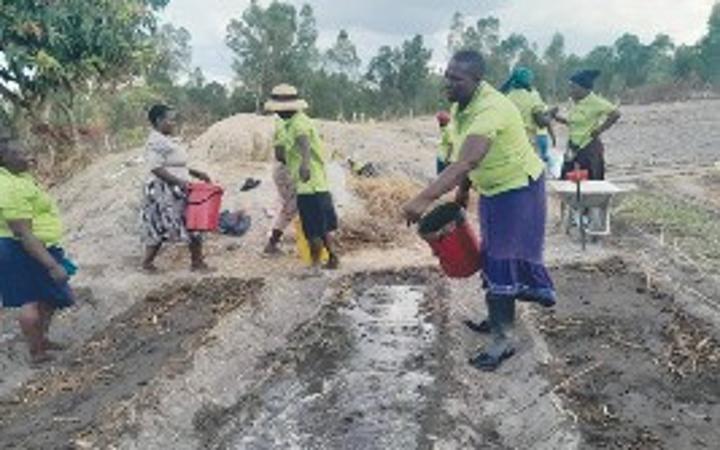By Nhau Mangirazi
Africa-Press – Zimbabwe. FAITH Vela is happy that an all-female group aimed at empowering communities is making strides in Murehwa West constituency, Mashonaland East province.
As the chairperson of Mbariro, a community based organisation that has 12 members, she is motivated by the thrust of generating sustainable development through horticulture production.
“Our farming group has its future anchored on commitment through hard work. We are fighting the effects of climate change in our communities,” Vela said.
The group was formed early this year before embarking on vegetable, tomato, carrot and herb production.
“Healthy families is part of community development,” Vela said.
Agritex extension officer Loveness Mudarikwa confirmed that the all-women programme is a mixed bag.
“We have both elderly and youths among them. They are from different villages including Chitemerere, Kadzviti, Bango and Chingara. Though it is in its infancy stages, it is promising,” Mudarikwa said.
The project is under the stewardship of Emilda Tagutanazvo (49), whose dedication is to empower communities in Zimbabwe to address climate-related challenges.
She is implementing Mbariro project with 12 women in Murehwa’s rural Ward 28, a programme geared towards sustainable development as a possibility of agro-based solutions to poverty alleviation.
“Growing up in rural areas, I witnessed the potential of agro-based solutions to alleviate poverty,” Tagutanazvo said.
“This inspired me to pursue a career in Science, studying Mathematics, Biology and Chemistry at Zimuto and Gutu High schools in Masvingo province.”
Tagutanazvo went on to earn a degree in Psychology and a Masters in Social Ecology from the University of Zimbabwe, followed by a PhD in Water Institutions.
“My research focuses on applied agro-ecology, exploring ways to promote sustainable agriculture and empower women.
“Through my work with the International Water Management Institute and as a lecturer at the University of Zimbabwe, I have developed an Afrocentric women-led model for climate change resilience.
“My project, Mbariro, empowers women in peri-urban Zimbabwe through permaculture skills, enhancing food security, health, and income.”
Mbariro utilises innovative technologies like liquid fertiliser, vermicompost and organic pesticides to reduce soil toxicity and promote sustainable livelihoods.
“I am proud to see the impact of this project, which has improved the lives of countless women and families,” Tagutanazvo added.
“I am driven by my passion for creating positive change and believe that by empowering women and promoting sustainable agriculture, we can build a more resilient and prosperous future for Zimbabwe.
“My story is one of hope and determination, inspiring others to join the fight against climate change and poverty.”
The project is funded by The World Academy of Science-UNESCO.
Through Mbariro, Tagutanazvo is not only promoting sustainable agriculture, but also empowering women to become leaders in their communities.
“This project is a testament to the power of collaboration and innovation in driving positive change.
“My commitment is aimed at continuing to inspire others to join on this journey towards a brighter future for Zimbabwe.”
The World Academy of Sciences held a training for the advancement of science in developing countries in Addis Ababa, Ethiopia, under the theme Science-based Solutions for Climate Action in Africa between October 28 and 30.
The event brought together 30 scientists to address climate-related challenges through interactive sessions and collaborative learning, with the goal of strengthening their scientific and leadership.
The event featured training sessions on leadership, team-building, education, and the role of community and faith-based networks in helping people respond to and recover from challenging situations.
Participants came from Bangladesh, Benin, Botswana, the Democratic Republic of Congo, Ethiopia, Ghana, Kenya, Malawi, Mozambique, Niger, Rwanda, Tanzania, Uganda and Zimbabwe.
Source: NewsDay
For More News And Analysis About Zimbabwe Follow Africa-Press






